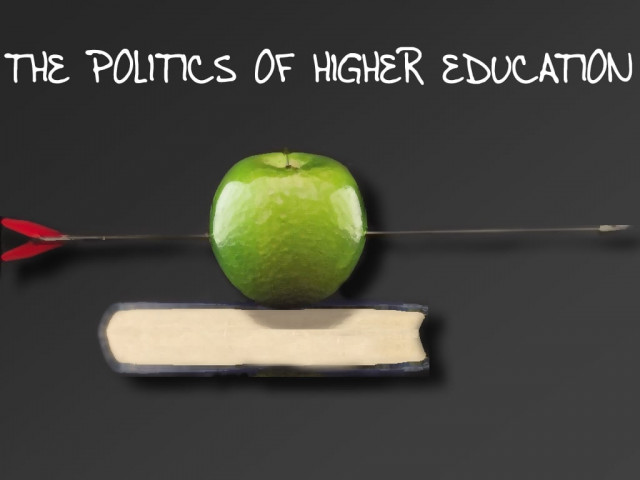HEC and devolution: Getting the third degree
Move to unseat executive director of commission latest battle in war for control of Pakistan’s higher education...

The Higher Education Commission, formed under General Pervez Musharraf in 2002, rode the crest of spectacular autonomy and generous funding for the first six years of its existence. Its bank balance started at Rs4 billion and was increased five-fold to Rs21.5 billion by 2007.
It suffered a reversal of fortune in 2008, however, when the government changed and with it the agenda. HEC’s funds were immediately slashed, stranding students on scholarships abroad without stipends. There was also talk of putting the commission under the control of the ministry of professional and technical training. Founding chairman, Dr Attaur Rehman, resigned in protest over the moves.
Though officially not with the HEC any more, Dr Rehman is still deeply concerned with the way it is run. Speaking at a press conference earlier this week, he alleged that the government was out to systematically wipe out the HEC’s achievements and destroy it just as it had done with two key institutions, the National Commission of Nanotechnology and the National Commission on Biotechnology.
The bad blood, he believes, was borne partly out of “wrath of the 51 parliamentarians whose degrees were proved [to be] fake”. “[This has been] unbearable for them,” he told The Express Tribune. Indeed, the timing matches up.
“The crackdown on the HEC started right after the degree-verification issue which expos[ed] the corrupt legislators who deceived the nation,” adds HEC executive director Dr Sohail Naqvi, the man who is at the heart of the controversy.
The problem dates to July 2010, when the Supreme Court ordered the Election Commission of Pakistan to verify the educational degrees of legislators after a Pakistan Muslim League-N MPA Punjab was disqualified for having forged his degree. This opened the floodgates, as 51 legislators stood disqualified. Almost 250 other legislators would have also been disqualified had the verification process continued, maintains Dr Rehman. Small wonder then, that parliamentarians stiffly resisted the ECP’s attempts to verify their degrees again this year when it was checking for dual nationalities.
HEC insiders confirm that legislators put pressure on the commission, including its chairman Javaid R Leghari, during the degree verification process. For his part, however, Leghari denied this during a Senate hearing on December 5. There was pressure, but Leghari was not deterred by it, explains a high-ranking HEC official. It has been reported that Leghari received multiple threats, including to his life, and his younger brother, Farooq Leghari, a bureaucrat, was also arrested by the Sindh government in July 2010.
This was not the only nastiness that bogged down the HEC. It was slotted for devolution after the 18th Amendment was passed in 2011. The government was preparing ways to make education a provincial subject as decided under the new law. But then, students and faculty from universities across Pakistan vehemently protested the move and launched a ‘Save HEC’ movement with Dr Rehman leading the charge. Petitions were filed and in April 2011, the Supreme Court ruled against handing the HEC to the provinces in an interim order.

But that was not the end of that saga. In June this year, yet another attempt was made to devolve the HEC whose independent status was revoked. It was put under the ministry of professional and technical training (now renamed ministry of education and training). But here too, the Sindh High Court suspended the decision on July 18.
Now the government has made a move again, but this time not to devolve the HEC but to control it by appointing its executive director. The HEC has been told by the establishment division that the prime minister appoints its management officials. This has been disputed by lawyer Salman Akram Raja. “The 17-member board appointed by the PM is the only authority that can appoint the executive director,” he says. Raja should know, he was a member of the committee that drafted the HEC Ordinance, the law that governs it. He puts this “new found craving for the HEC” down to the government’s desire to control HEC’s purse strings. “The government has moved from shunning the HEC to wanting to completely control it,” he said.
For HEC Executive Director Dr Naqvi, there are multiple reasons for this new push to remove him - the main one being money. The HEC’s annual budget is Rs48 billion and it gives over 15,000 scholarships on merit. “These politicians and bureaucrats cannot see their kith and kin not enjoying this opportunity,” remarked Dr Rehman.

On the flip side, though, the HEC also has 48 billion reasons to want to control its funding. “Where does the HEC get its funds from in the first place?” points out Dr Mohammad Waseem, a professor of political science at the Lahore University of Management Sciences. “It gets these funds from the government which allocates funds to the HEC.” He argues that the HEC has to be accountable to some institution outside itself, which is the government. This tug of war is, for him, rooted in the political context of a government committed to devolution.
In the end, though, devolution of the HEC means that there would be no central body setting a higher education agenda, an agenda many have argued was not entirely on the right track to begin with. Dr Bashir Ahmad Khan, who is the dean of the school of management at the Forman Christian College, Lahore, and who researches management of higher education, puts it simple: “Despite the criticisms of the HEC, of which there are many, I don’t want to see it go. It is essential that there be an independent monitor and a central organisation, that shouldn’t be shut down or politicised.”
Published in The Express Tribune, December 9th, 2012.



















COMMENTS
Comments are moderated and generally will be posted if they are on-topic and not abusive.
For more information, please see our Comments FAQ